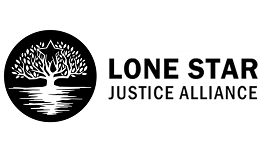
Lone Star Justice Alliance
Model & Strategy
Lone Star Justice Alliance (LSJA) boldly addresses systemic failures in the criminal legal system through advocacy and innovative, evidence-based programs that improve life outcomes for youth and emerging adults. At the end of 2024, Lone Star Justice Alliance directly supported over 1,150 individuals through innovative litigation, training, and workforce programs while impacting almost 60,000 more through advocacy and policy change.
The Problem
The criminal legal system in Texas overlooks the unique developmental stage and distinct needs of justice-involved young people, failing to provide protection and exacerbating trauma instead of offering a path for people to heal. In Texas, children as young as 14 can be prosecuted as adults even though they lack a full understanding of consequences due to their developing brains. Once incarcerated, youth face frightening environments in state facilities, resulting in unaddressed trauma and high rates of recidivism (return to prison). To promote recovery and prevent recidivism, system-involved young adults need appropriate therapy, education, and career training paired with trusting relationships and wraparound support before leading productive, joyful lives.
The Solution
Lone Star Justice Alliance drives systemic change in the criminal legal system through advocacy and innovative programs aimed at improving life outcomes for youth and young adults. Their three strategic initiatives leverage evidence-based best practices to engage, redirect, and rehabilitate individuals who have been chronically disengaged and mistreated.
1. Education and workforce programs: LSJA offers developmentally appropriate interventions and support to youth involved in the legal system, connecting them with the education and employment opportunities essential for building better futures.
2. Strategic litigation: LSJA ensures young people are treated fairly during the legal and sentencing process, and that their basic human rights are upheld through their strategic litigation efforts.
3. Policy and advocacy: LSJA also champions policy change and advocacy at the state and local levels to create a more equitable and just system.
Over the next five years, LSJA’s work to promote the improvement of the social determinants of health as an essential component of rehabilitative outcomes for youth involved in the legal system will serve as a national policy and practice model. LSJA’s ultimate goal is to make justice accessible to all youth and young adults in Texas through evidence-based programs, innovative policies, and community engagement.



As the child of a corrections officer and the granddaughter of law enforcement officers, Elizabeth grew up aware of the tension between her family’s commitment to fairness and justice and a system riddled with racial inequality, incompetent lawyers, and arbitrary sentences. A graduate of Yale University and the University of Texas School of Law, Elizabeth clerked for the Fifth Circuit Court of Appeals and the South African Constitutional Court before joining Williams & Connolly, where she engaged in high-stakes litigation. She left private practice to join the faculty at the University of Southern California School of Law and, in 2017, founded LSJA to fulfill her commitment to true justice. Elizabeth is an award-winning attorney and a national leader in youth justice reform.

Impact
In 2024, LSJA’s legal team handled 59 legal matters and addressed 140 requests for assistance, totaling 6,085 pro-bono legal service hours. LSJA also trained more than 100 imprisoned women to file their own clemency applications.
LSJA’s 2024 advocacy efforts resulted in 44 community trainings reaching 155 organizations, one strategic plan impacting thousands of North Texas justice-involved youth, and the launch of a state-wide data dashboard providing the most comprehensive information on opportunity youth in the state of Texas.
In 2024, LSJA’s community-based programs impacted 114 individuals through case management, referrals, workforce readiness, training, and employment services. 100% of those who entered into workforce development received an industry-recognized credential.

